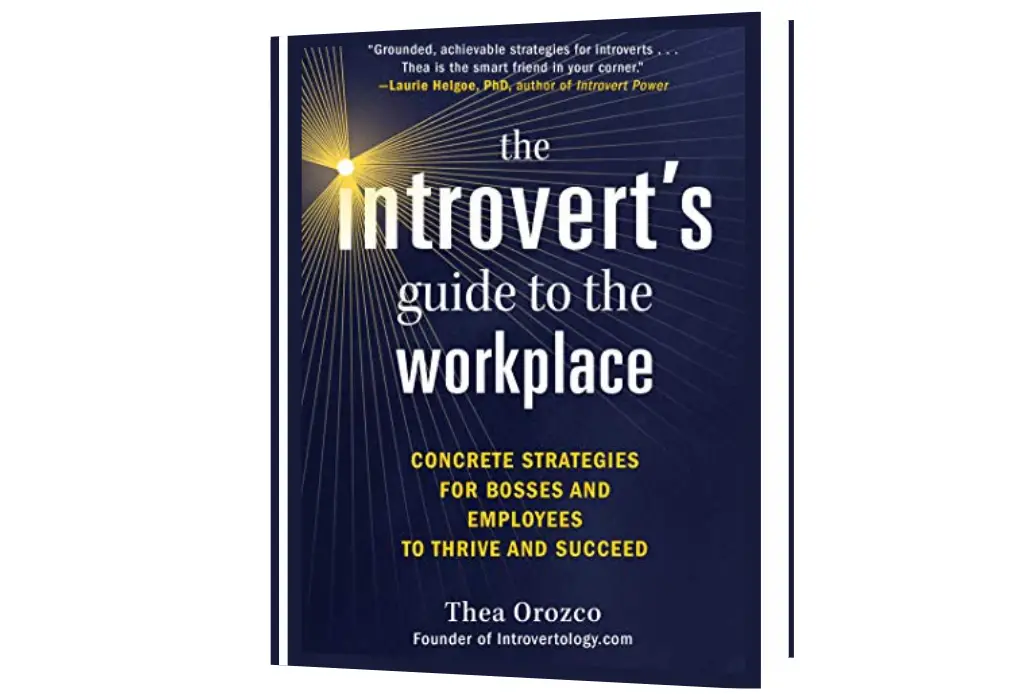Tap Into Your Natural Introvert Strengths in the Office with Actionable Tips and Advice
Introverts make up a third of the population, and we’re hardwired to thrive—especially in the workplace! However, it’s not uncommon for introverts to feel out of place in the office, where it seems the only ones succeeding are outgoing personalities ready to toot their own horn.
Thea Orozco busts that myth, showing how the workplace is truly a setting for introverts to succeed based on their innate skillset and natural introvert strengths. With topics ranging from overcoming phone phobia to developing an authentic leadership style, The Introvert’s Guide to the Workplace guides introverts through thriving at work without having to shout—whether you are a boss, an employee, or a career person. Learn from actionable tips and practical advice, and surmount office challenges and let your introversion take the lead:
Combat interview anxiety and negotiate your salary
Make meaningful connections at networking events
Be heard and noticed at meetings or on the stage
Navigate difficult social situations
Become an effective leader with your introvert strengths
And more!
Including diverse expert interviews, Quiet Brilliance is every working introvert’s handbook and guide that they can refer to throughout their career for guidance on tricky or draining situations and motivation to enlist the power of their inner introvert to succeed.
Understanding Introversion
Orozco begins by breaking down the concept of introversion, explaining that it is not about disliking people but rather about how one processes and responds to social stimulation. She draws on the research of psychologists like Carl Jung and contemporary studies on personality traits to provide a clear understanding of what makes someone an introvert. For introverts, social interactions can be draining, requiring time alone to recharge. This is in contrast to extroverts, who gain energy from social engagement.
This foundational understanding is crucial for the rest of the book because Orozco argues that introverts often face challenges in the workplace simply because the corporate world is typically structured around extroverted ideals. From open-plan offices to constant networking, these environments can feel overwhelming to introverts, leading to stress, burnout, and underperformance.
Orozco is quick to reassure readers that introversion is not a weakness. Instead, she presents it as a powerful asset that, when harnessed properly, can lead to career success. Introverts are often reflective, thoughtful, and excellent listeners—qualities that are essential in any professional setting.
The Extrovert Ideal in the Workplace
One of the book’s central arguments is that many workplaces are designed to favor extroverted behaviors. Open offices, frequent meetings, and team-building exercises are often geared towards those who thrive in group settings. Introverts, on the other hand, may struggle to concentrate in noisy environments or find themselves feeling awkward in situations that require constant social interaction.
Orozco points out that this doesn’t mean introverts are unsuited to leadership or success in such environments. Instead, the issue is with the expectation that everyone should conform to the extroverted ideal. Introverts can often feel pressure to “fake it” or adopt extroverted traits to fit in, which can be both draining and unsustainable over time.
Strategies for Success
The bulk of the book is devoted to practical strategies introverts can use to not only survive but thrive in the workplace. These strategies are rooted in self-awareness and self-acceptance. Orozco encourages introverts to embrace their natural strengths and to stop apologizing for not being extroverted. Instead of trying to force themselves into uncomfortable situations, they should focus on finding ways to work that align with their personalities.
1. Managing Energy Levels
A key issue for many introverts is managing energy levels in environments that require constant social interaction. Orozco suggests several strategies for introverts to protect their energy, including:
- Creating a personal recharge routine: Taking regular breaks in a quiet space or going for a short walk to reset.
- Strategically scheduling meetings: If possible, scheduling important meetings earlier in the day when energy levels are higher, and leaving time for recovery afterward.
- Setting boundaries: Politely but firmly declining unnecessary social engagements or over-commitments that may lead to burnout.
2. Networking for Introverts
Networking is a crucial part of career advancement, but it can be particularly challenging for introverts. Orozco acknowledges the anxiety many introverts feel at the thought of attending networking events, but she offers a more introvert-friendly approach to networking:
- Focus on one-on-one interactions: Instead of trying to work a room, introverts can focus on having meaningful conversations with just one or two people.
- Prepare in advance: Having a few conversation starters ready and researching the attendees beforehand can make networking less intimidating.
- Use online networking: Platforms like LinkedIn provide an opportunity for introverts to build connections and showcase their expertise without the pressure of in-person interactions.
3. Public Speaking
Public speaking is another area that introverts may find challenging, yet it’s often a necessary skill for career advancement. Orozco provides practical tips for overcoming the fear of public speaking:
- Preparation is key: Thorough preparation helps introverts feel more confident and reduces anxiety. Orozco suggests practicing in front of a mirror or with a trusted friend.
- Leverage introvert strengths: Introverts often excel at crafting thoughtful, well-researched presentations. Focusing on delivering valuable content rather than on the performance aspect can help reduce anxiety.
- Start small: Begin by speaking up in small meetings or giving presentations to smaller, more familiar groups before tackling larger audiences.
Working in Teams
Collaboration is a common feature of most workplaces, and introverts may find themselves struggling in team settings that prioritize constant communication and brainstorming. Orozco suggests several strategies for introverts to thrive in team environments:
- Playing to strengths: Introverts are often strong in areas like deep thinking, problem-solving, and active listening. Orozco advises introverts to highlight these strengths and take on roles that align with them.
- Speaking up strategically: Introverts may not feel comfortable contributing to every discussion, but they can make a powerful impact by speaking up when they have something important to say.
- Requesting alone time for focus work: If possible, introverts should advocate for having blocks of time to work alone, which can improve both productivity and creativity.
Leadership for Introverts
One of the most empowering sections of the book addresses the common misconception that introverts can’t be effective leaders. Orozco debunks this myth by pointing to successful introverted leaders like Bill Gates and Barack Obama, and she outlines the unique strengths introverts bring to leadership roles:
- Listening skills: Introverts are often excellent listeners, which allows them to make thoughtful, well-informed decisions and foster strong relationships with their teams.
- Empathy and Emotional Intelligence: Introverts tend to be more introspective, which can translate to high emotional intelligence and empathy—qualities that are critical in leadership.
- Calm and thoughtful decision-making: Introverts are less likely to make impulsive decisions and more likely to take the time to weigh options carefully. This can be a valuable asset in high-pressure situations.
Orozco emphasizes that introverts don’t need to adopt extroverted behaviors to lead effectively. Instead, they can lead by example, leveraging their strengths and leading in a way that feels authentic to them.
Building Confidence as an Introvert
A recurring theme throughout The Introvert’s Guide to the Workplace is the importance of self-confidence. Many introverts struggle with confidence in environments that reward extroverted behaviors, but Orozco offers several strategies to help introverts build confidence:
- Celebrate strengths: Introverts often undervalue their own strengths. Orozco encourages readers to regularly acknowledge their achievements, no matter how small.
- Challenge negative self-talk: Introverts may have internalized negative messages about their personalities. Orozco suggests challenging these thoughts and replacing them with positive affirmations.
- Practice self-compassion: Instead of being hard on themselves for not being more extroverted, introverts should practice self-compassion and give themselves permission to be who they are.
Navigating Office Culture
Office culture can be another significant challenge for introverts, particularly in environments that prioritize social events and group activities. Orozco provides several strategies for introverts to navigate these situations without feeling drained:
- Pacing social interactions: Introverts can choose to participate in office social events selectively, focusing on the ones that feel most comfortable and rewarding.
- Finding allies: Building relationships with coworkers who understand and respect introversion can provide a valuable support system.
- Creating boundaries: It’s important for introverts to set boundaries around social interactions, whether it’s declining invitations to after-work events or scheduling time alone to recharge during the workday.
Remote Work and Introverts
With the rise of remote work, Orozco addresses the unique opportunities and challenges this presents for introverts. On the one hand, remote work can be ideal for introverts, providing more control over their environment and fewer social interactions. However, Orozco also notes that remote work can lead to feelings of isolation if not managed properly.
She suggests several strategies for introverts to make the most of remote work:
- Set clear boundaries: Without the physical separation of an office, it’s important to set boundaries around work hours to avoid burnout.
- Stay connected: Introverts may need to make an extra effort to stay connected with colleagues and maintain professional relationships in a remote setting.
- Create a dedicated workspace: Having a quiet, distraction-free workspace can help introverts focus and be more productive.







